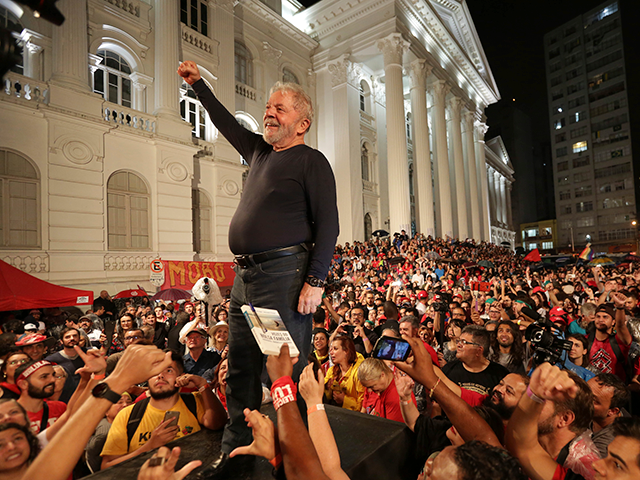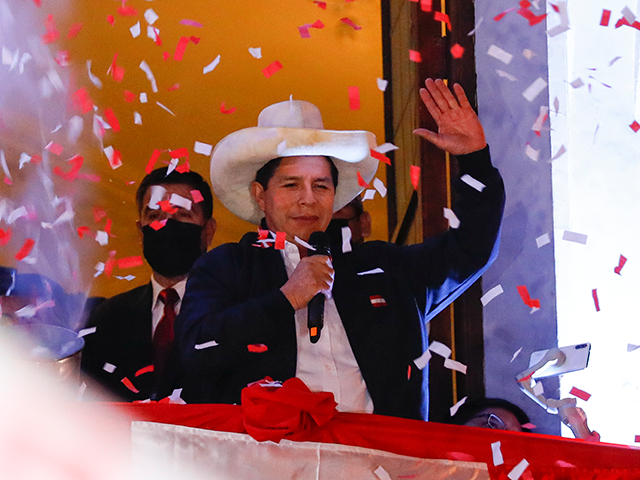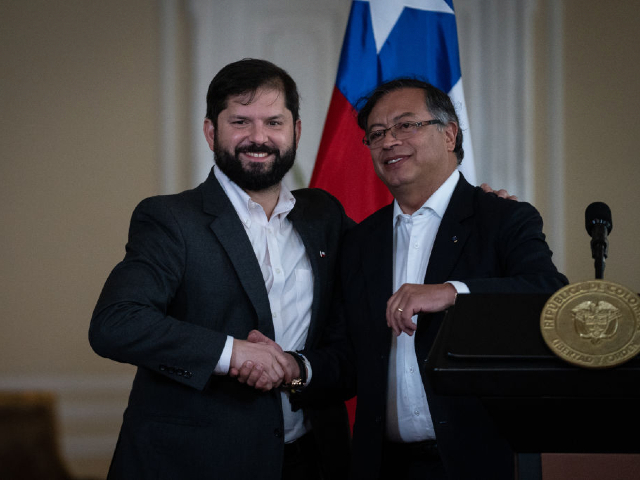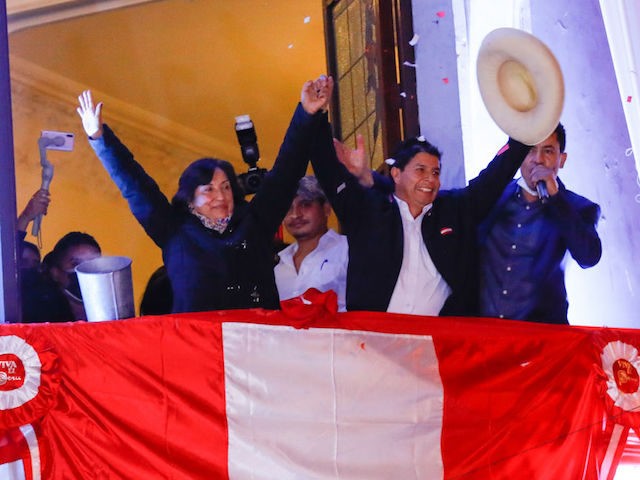The election of convicted felon Luiz Inácio Lula da Silva to the presidency of Brazil in October – a hardline socialist who had, in his previous presidencies, been seen as the leader of the international left – prompted a wave of celebrations among the world’s Marxists that Latin America had finally fallen into near-complete leftist rule.
With nearly every major country in the region under a leftist government, corporate media outlets were quick to announce that a new “pink tide” had surged in Latin America following the fall of several leftist regimes in the aftermath of the collapse of the Venezuelan economy. The leaders could now work together on “regional integration” – localized globalism in which countries cooperate to impose policies in lockdown. Lula himself revived the socialist plan of creating a unified Latin American currency, a “euro” for South America that he has provisionally dubbed the “sur.”
Lula will take office in January, but the collapse of the myth of a unified Latin American left has already begun. Prominent leftists throughout the region are getting themselves arrested on charges of corruption and violations of the constitution. In freer countries, the leftists have failed to pass policy changes because they are simply not popular enough. In the dictatorships, patron states such as Russia and China have simply not bothered to invest enough in keeping the lights on. The dream of “regional integration” has collapsed in petty bickering between the dictators and the elected leaders.

Brazil’s former President Luiz Inacio Lula da Silva stands amid supporters during the final rally of his week-long campaign tour of southern Brazil, in Curitiba, Parana state, Brazil, March 28, 2018. (AP Photo/Eraldo Peres, File)
A functional Latin American right may exist only in a distant future, but a productive Latin American left is far from a reality.
Shortly before Lula defeated incumbent conservative Jair Bolsonaro, Gustavo Petro – a former guerrilla member who advocates for legalizing cocaine – became Colombia’s first Marxist president in June. A year ago, Gabriel Boric, a Marxist former student protester, narrowly defeated conservative candidate José Antonio Kast to become president of Chile. Pedro Castillo, a Marxist belonging to a political party that openly praised Vladimir Lenin, became president of Peru last summer; far-left contender Xiomara Castro of Honduras joined him as a head of state in November. Prior to those elections, three Latin American countries – Venezuela, Cuba, and Nicaragua – were under communist/socialist dictatorships and Bolivia, Mexico, and Argentina elected socialist presidents. El Salvador’s Nayib Bukele, something of a political black sheep, had risen to prominence as a member of the country’s mainstream leftist party, the Farabundo Marti National Liberation Front (FMLN).
With the Brazilian election results, Latin America's left leaning governments. | Source: https://t.co/9CSNteUY1c #maps #geography pic.twitter.com/hZJc2HmBOX
— MapAddict (@AddictMap) October 31, 2022
The “pink tide” fell in jeopardy almost immediately after Lula’s election – in neighboring Argentina. Socialist President Alberto Fernández is set to remain as president in 2023, but faces a stiff challenge from a rising libertarian Argentine right led by popular economic Javier Milei. Whether his vice president, Cristina Fernández de Kirchner, will make it to that race on his ticket or not remains a mystery. Fernández de Kirchner served as president during the first “pink tide” alongside Lula, served as first lady under late husband Néstor Kirchner, and is widely considered the Argentine left’s most popular leader. She has faced years of corruption allegations, from misuse of public funds to helping protect Iranian jihadists from international arrest. This month, a court finally sentenced her to six years in prison on charges of giving lucrative government works contracts to her friends. The court banned her from holding public office again.
As Fernández de Kirchner is currently in public office, she is immunized from actually serving prison time. What will happen to her, and her case, when her vice presidential term is over remains a mystery, but years of legal appeals distracting her from actively campaigning are very likely. Fernández de Kirchner announced she would no longer pursue another presidential run in light of her conviction, leaving Argentina’s leftist coalition with no clear successor to Alberto Fernández.

Pedro Castillo waves supporters during a celebration after being confirmed as new president of Peru at the campaign headquarters on July 19, 2021, in Lima, Peru. (Ricardo Moreira/Getty Images)
In Peru, the left suffered an even more dramatic defeat. Pedro Castillo made it a little more than a year before being ousted from office. Facing a third impeachment vote in Congress – the Peruvian constitution allows for lawmakers to impeach a president without offering a clear reason, leading to many such processes – Castillo announced last week, hours before the vote, that he was staging a coup, dissolving Congress and ruling by decree. Peruvian police promptly arrested him and his vice president, Dina Boluarte, became Peru’s sixth president in six years.
Peruvian leftists responded to the political mess with deadly riots, particularly targeting food processing plants to pressure Boluarte to free Castillo or endanger the nation’s food supply. The protests are ongoing at press time, but doing little to generate popular goodwill for the Peruvian left.
Castillo’s largely self-inflicted wound places an exclamation point on the chaos of Latin American leftist leadership currently. Others are failing in a much less exciting way. In Chile, Gabriel Boric resoundingly failed to deliver on his core campaign promise – replacing the nation’s constitution – when a national vote rejected a draft in September that would have been arguably the most progressive constitution in vigor anywhere in the world today. Languishing approval ratings have given Boric little room to push any other policy agendas, though he recently managed to get lawmakers to start drafting an entirely new constitution yet again last week. The drafting process comes with no guarantees that Chileans will approve the final product.
Boric’s poor approval ratings and the generally conservative nature of Chile’s voters has made it difficult for Boric to seek support from fellow regional leftists. In an attempt to win swing voters, he has decided to adopt an entirely different strategy from other leftists in the region: continuously condemning human rights abuses in Venezuela.
“It really pisses me off when you are from the left, so you condemn the violation of human rights in, I don’t know, Yemen or El Salvador, but you cannot talk about Venezuela or Nicaragua,” Boric said at an event in New York in September.

Gabriel Boric, Chile’s president, left, and Gustavo Petro, Colombia’s president, hold a joint press conference at the Presidential Palace in Bogota, Colombia, on Monday, Aug. 8, 2022. (Nathalia Angarita/Bloomberg)
“I went to Venezuela in 2010, and I started asking myself questions when I started seeing the repression of the protests and the manipulation of some elections, and I said ‘This is not right. We have to be able to criticize it,'” he continued. “People on the left in Chile said, ‘No, no, no, no, no, you don’t talk about our friends.’ And I think that’s completely wrong.”
Boric’s attacks do not appear to have had any documentable impact on his approval ratings at home, but make a united “sur” currency including both Chile and Venezuela, for example, impossible. While Chileans have taken no notice of his remarks, Venezuelan dictator Nicolás Maduro has, calling Boric – without naming him – a “coward” on multiple occasions.
“There are those who accuse us of being dictators. I understand that Sebastián Piñera [former president of Chile] does it, I understand that Jair Bolsonaro accuses me, I understand that fascism accuses us,” Maduro said in November. “But, from the left, whoever tries to accuse us will have to sit face to face with us to debate the truth of Venezuela.”
Boric’s rhetoric is an outlier, but the domestic circumstances that influenced his opposition to the leftist dictatorships of the region are not. Protests against Gustavo Petro, president of Chile for less than half a year, has attracted tens of thousands of conservatives demanding their lawmakers not support Petro’s policies, including a rapprochement with Venezuela.
Arce, in Bolivia, has his hands tied by both the outsized influence of Evo Morales – a former president credibly accused of pedophilia removed from power in a similar failed coup attempt to Pedro Castillo’s – and a conservative movement demanding freedom for Jeanine Áñez, the senator who took over from Morales in 2020. Arce’s government has imprisoned and tortured Áñez, accusing her of staging a coup when, in reality, she became president because everyone above her in the line of succession, all socialists, fled the country with Morales.
In Brazil, Lula will first face the challenge of pacifying a nation in which half the country voted against him and thousands are still demanding, months after the election, that the military prevent Lula from taking office. He is highly unlikely to receive any meaningful support from abroad – the rest of the region’s leftists simply have too many other problems on their hands.

COMMENTS
Please let us know if you're having issues with commenting.